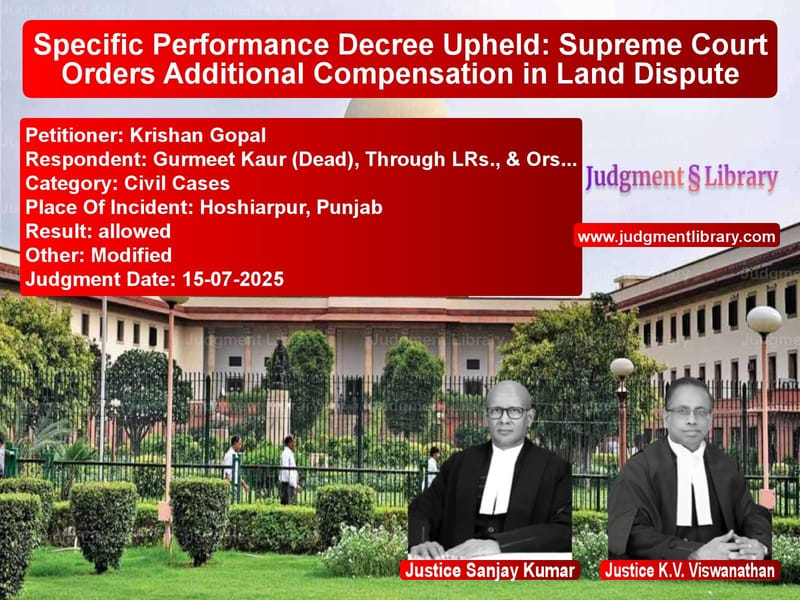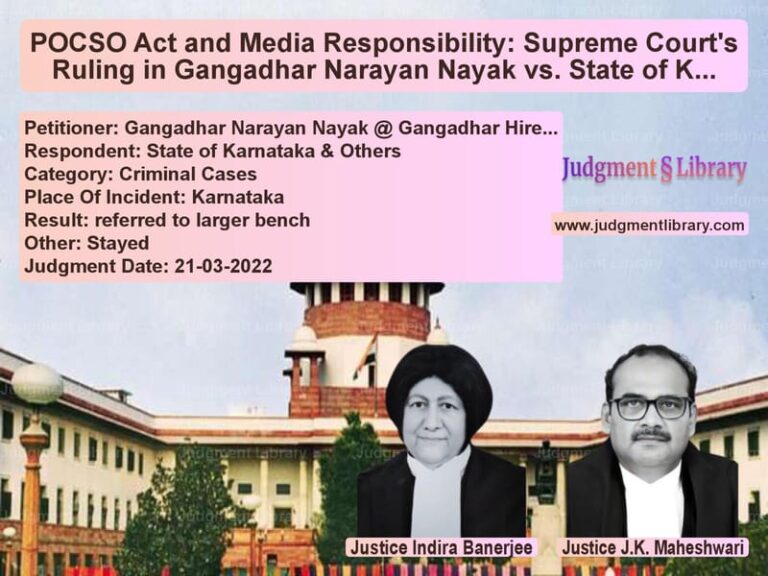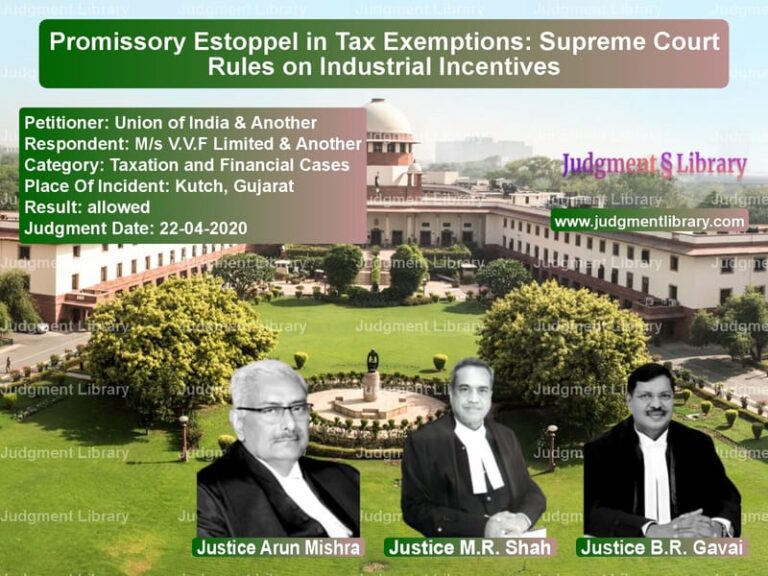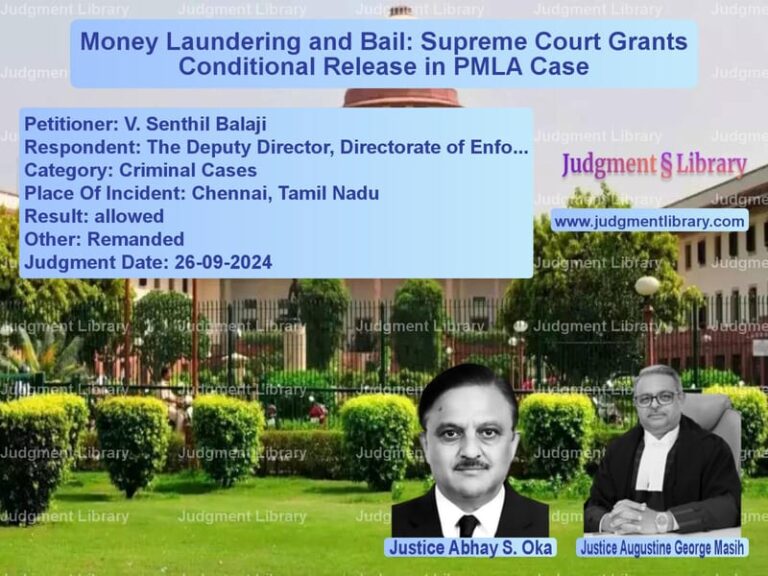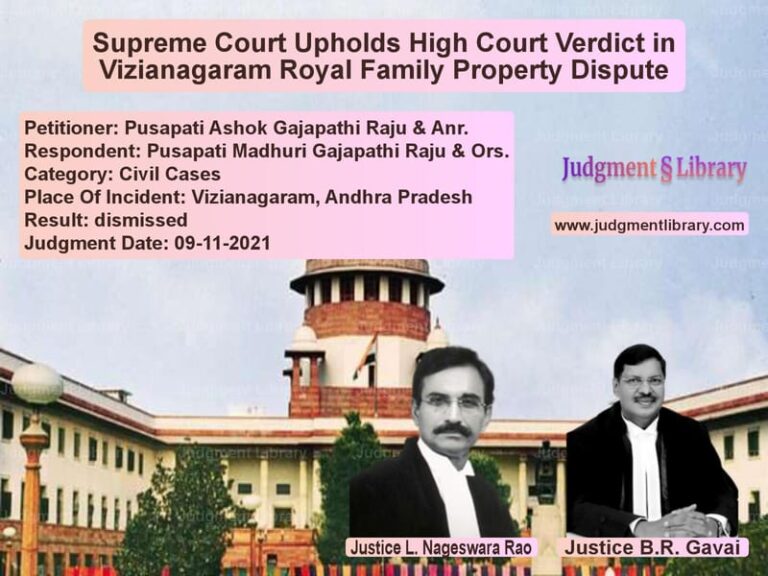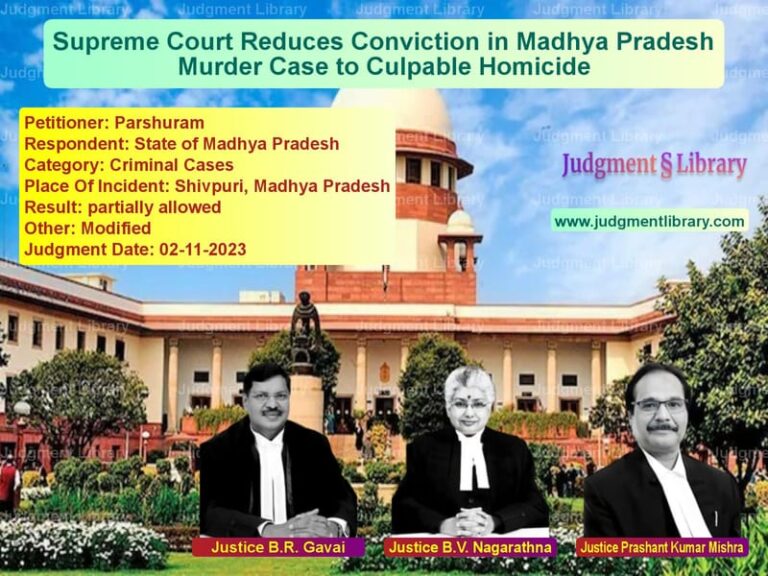Specific Performance Decree Upheld: Supreme Court Orders Additional Compensation in Land Dispute
In a landmark judgment that underscores the importance of contractual integrity while balancing equitable considerations, the Supreme Court has delivered a comprehensive ruling in a complex land dispute spanning over two decades. The case involved 9 acres of agricultural land in Hoshiarpur, Punjab, and pitted the original buyers under a 2001 agreement against subsequent purchasers and a claimed tenant, revealing layers of legal maneuvering that tested the boundaries of specific performance jurisprudence.
The dispute originated from an Agreement to Sell dated October 8, 2001, where Krishan Gopal agreed to sell his agricultural land measuring 73 Kanals 12 Marlas to Gurmeet Kaur and her two sons for ₹10,00,000. A sum of ₹1,00,000 was paid as earnest money, with the balance to be paid by January 31, 2002, when the sale deed was to be executed. Crucially, the agreement contained a recital that Krishan Gopal would obtain possession of the suit land to the satisfaction of the buyers and hand it over at the time of execution – clearly indicating that he was not in possession when the agreement was signed.
The Legal Battle Unfolds
When Krishan Gopal failed to execute the sale deed on the stipulated date, Gurmeet Kaur and her sons filed a suit for specific performance in April 2002. They made a significant claim in their plaint – that they had been put in possession of the land in November 2001 and had spent about ₹8,00,000 to make it cultivable. They asserted they were always ready and willing to perform their part of the contract and had approached Krishan Gopal on January 25, 2002, but he failed to appear at the Sub-Registrar’s office on January 31, 2002.
Krishan Gopal, in his written statement filed in December 2002, admitted executing the agreement but contested the buyers’ readiness and willingness. He claimed he had issued a legal notice on March 11, 2002, calling upon them to pay the balance amount and get the sale deed executed within 15 days, but they intentionally avoided accepting the notice and instead filed the suit.
During the trial, a crucial development emerged when Arun Kalia surfaced claiming possession of the land. The Tahsildar-cum-Assistant Collector, Grade II, Hoshiarpur, had passed an order on May 22, 2002, holding that Arun Kalia was proved to be in possession of the suit land and directing correction of the Khasra Girdwari to show him as the cultivator. Despite this knowledge, Krishan Gopal had not disclosed this fact in his written statement.
The Court Proceedings and Surprising Revelations
The Trial Court decreed the suit in favor of the buyers on October 21, 2008, finding them financially sound and ready to perform their contractual obligations. The Court noted Krishan Gopal’s inconsistent stands about whether he attended the Sub-Registrar’s office on January 31, 2002, which weighed against him. Significantly, the Trial Court directed delivery of possession to the buyers even though they hadn’t specifically prayed for it in their plaint.
Krishan Gopal’s appeals before the Additional District Judge and the High Court were dismissed, with the High Court noting concurrent findings of fact about the buyers’ readiness and willingness and finding no substantial question of law.
Meanwhile, startling revelations emerged during execution proceedings. Arun Kalia and two others filed objections claiming that Krishan Gopal had executed two registered sale deeds in his favor on May 29, 2002 – after the specific performance suit was filed but without disclosing this during the trial. Arun Kalia claimed an oral agreement from January 1998 where Krishan Gopal had given him the land to make it cultivable at his own expense, allowing him to cultivate for five years without rent and thereafter continue as a tenant.
Even more surprisingly, Arun Kalia claimed he had subsequently sold the land to Krishan Dev Pathak and his wife for ₹60,00,000 under two registered sale deeds dated April 4, 2012. The Executing Court and High Court both rejected these objections, holding that the sales were hit by Section 52 of the Transfer of Property Act and the doctrine of lis pendens.
The Supreme Court’s Incisive Analysis
The Supreme Court, in its judgment delivered by Justice Sanjay Kumar and Justice K.V. Viswanathan, conducted a thorough examination of the entire factual matrix and legal principles involved. The Court made several crucial observations that shaped its final decision.
On the question of readiness and willingness, the Court reaffirmed established principles, stating that “Well settled is the legal proposition that, to prove his readiness and willingness, a purchaser need not necessarily produce the money or carry it with him or vouch a concluded scheme of finance.” The Court further emphasized that “readiness and willingness is to be inferred from the conduct of the parties.”
The Court was particularly critical of Krishan Gopal’s conduct, noting that “though Krishan Gopal filed his written statement in the suit in December, 2002, he did not disclose therein that Arun Kalia was a tenant in possession of the suit land; that he had secured the order dated 22.05.2002 confirming that fact; and that he, Krishan Gopal, had executed two registered sale deeds on 29.05.2002 in Arun Kalia’s favour.”
The Court found the claims of Arun Kalia highly suspicious, observing that “Arun Kalia alleged collusion and fraud in the filing of the specific performance suit but, on the other hand, we find that it is his so-called oral agreement of tenancy with Krishan Gopal that smacks of collusion and fraud.” The Court questioned the credibility of the arrangement where “Krishan Gopal supposedly agreed to put him in possession to enjoy and cultivate the suit land for a period of five years without even paying any rent and continue thereafter as a regular tenant!”
The Court also noted the inconsistency in the sequence of events: “The other self-serving story of Krishan Gopal turning against Arun Kalia, constraining him to approach the Tahsildar, Hoshiarpur, also does not jell with the willing and voluntary execution of sale deeds by Krishan Gopal in Arun Kalia’s favour immediately thereafter.”
Legal Principles on Possession and Specific Performance
The Supreme Court addressed the important legal question about the Trial Court granting the relief of possession even though it wasn’t specifically prayed for in the plaint. The Court referred to Section 22 of the Specific Relief Act, 1963, and the precedent in Babu Lal vs. Hazari Lal Kishori Lal, holding that “in appropriate cases of specific performance of contracts of sale of immovable property, the Court can order delivery of possession of the property even if it has not been specifically asked for.”
The Court concluded that “the failure on the part of the plaintiffs to amend their suit prayer, so as to seek the relief of delivery of possession, cannot be held against them. At best, it was an omission on their part which was not fatal.”
On the question of escalation in land prices – the suit land’s value had increased dramatically from the original agreement price of ₹10,00,000 in 2001 – the Court reaffirmed that “mere escalation of land prices would not be a reason, by itself, to deny the equitable relief of specific performance once sufficient grounds are made out for granting such relief.”
The Balanced Final Outcome
While upholding the specific performance decree, the Supreme Court exercised its equitable jurisdiction to balance the interests of justice. Noting that the balance sale consideration of ₹9,00,000 had been deposited in 2012 and that land prices had seen an “astronomical rise,” the Court directed additional compensation.
The Court ruled that “in addition to the balance sale consideration of ₹9,00,000/- deposited with the Executing Court along with the interest accrued thereon, if any, Krishan Gopal should be paid a further sum of ₹25,00,000/- towards the sale consideration.” This amount was to be deposited within 12 weeks from the date of the judgment.
The Court declared the subsequent sale transactions null and void, stating that “The two registered sale deeds dated 29.05.2002 executed by Krishan Gopal in favour of Arun Kalia and, in consequence, the two registered sale deeds dated 04.04.2012 executed by Arun Kalia in favour of Krishan Dev Pathak and Kamla Dev Pathak in relation to the suit land are declared null and void.”
This judgment represents a sophisticated application of equitable principles – upholding contractual obligations while ensuring fairness in light of changed circumstances, and firmly rejecting attempts to defeat legitimate claims through collusive transactions. It reinforces the sanctity of contracts while demonstrating the court’s flexibility in molding relief to meet the ends of justice.
Petitioner Name: Krishan Gopal.Respondent Name: Gurmeet Kaur (Dead), Through LRs., & Ors..Judgment By: Justice Sanjay Kumar, Justice K.V. Viswanathan.Place Of Incident: Hoshiarpur, Punjab.Judgment Date: 15-07-2025.Result: allowed.
Don’t miss out on the full details! Download the complete judgment in PDF format below and gain valuable insights instantly!
Download Judgment: krishan-gopal-vs-gurmeet-kaur-(dead),-supreme-court-of-india-judgment-dated-15-07-2025.pdf
Directly Download Judgment: Directly download this Judgment
See all petitions in Specific Performance
See all petitions in Property Disputes
See all petitions in Contract Disputes
See all petitions in Judgment by Sanjay Kumar
See all petitions in Judgment by K.V. Viswanathan
See all petitions in allowed
See all petitions in Modified
See all petitions in supreme court of India judgments July 2025
See all petitions in 2025 judgments
See all posts in Civil Cases Category
See all allowed petitions in Civil Cases Category
See all Dismissed petitions in Civil Cases Category
See all partially allowed petitions in Civil Cases Category

